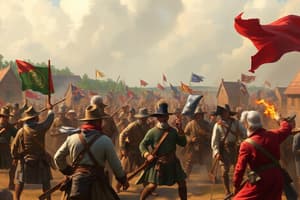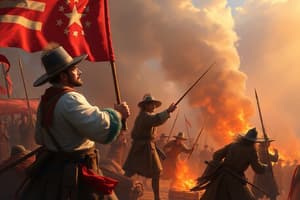Podcast
Questions and Answers
What significant action occurred on August 4, 1789, during the liberal revolution in France?
What significant action occurred on August 4, 1789, during the liberal revolution in France?
- Prohibition of guilds and monopolies
- Establishment of the National Assembly
- Legalization of divorce
- Abolition of all noble privileges (correct)
Which document was established on August 27, 1789, outlining the fundamental rights of citizens?
Which document was established on August 27, 1789, outlining the fundamental rights of citizens?
- The Ten Commandments of the Republic
- The French Constitution
- The National Assembly's Charter
- The Declaration of the Rights of Man and of the Citizen (correct)
What change did the September 1791 French Constitution implement regarding governance?
What change did the September 1791 French Constitution implement regarding governance?
- Created universal suffrage for all males
- Made the King head of state with an elected National Assembly (correct)
- Established absolute monarchy
- Limited law-making power to the king
What was one key economic reform introduced during the early stages of the French Revolution?
What was one key economic reform introduced during the early stages of the French Revolution?
In June 1790, what significant step was taken regarding the nobility?
In June 1790, what significant step was taken regarding the nobility?
What does Pomeranz argue as a key factor in Britain's industrialization?
What does Pomeranz argue as a key factor in Britain's industrialization?
According to Vries, what role did the 'mercantilist state' play in Britain's industrialization?
According to Vries, what role did the 'mercantilist state' play in Britain's industrialization?
What is one reason the content provides for the gap between Britain and China in the 19th century?
What is one reason the content provides for the gap between Britain and China in the 19th century?
What argument is raised against the Californian view on Britain and China's ressemblance?
What argument is raised against the Californian view on Britain and China's ressemblance?
What was the economic gap in living standards between industrializing regions and nonindustrialized regions in 1914?
What was the economic gap in living standards between industrializing regions and nonindustrialized regions in 1914?
What is a primary viewpoint of Social Darwinism?
What is a primary viewpoint of Social Darwinism?
What aspect of 'culture' does Vries suggest is significant in explaining the British industrial revolution?
What aspect of 'culture' does Vries suggest is significant in explaining the British industrial revolution?
What percentage of China's population lived in cities of over 10,000 people by the 19th century?
What percentage of China's population lived in cities of over 10,000 people by the 19th century?
According to Hobson's theory of imperialism, what leads to the need for foreign markets?
According to Hobson's theory of imperialism, what leads to the need for foreign markets?
How did Lenin's view of imperialism differ from Hobson's?
How did Lenin's view of imperialism differ from Hobson's?
How did the level of urbanization in Britain change from 1750 to 1800?
How did the level of urbanization in Britain change from 1750 to 1800?
Which of the following factors contributed to the American Revolution?
Which of the following factors contributed to the American Revolution?
What justification have Social Darwinists historically provided for certain social and political actions?
What justification have Social Darwinists historically provided for certain social and political actions?
What key aspect did Gallagher and Robinson emphasize regarding British imperialism?
What key aspect did Gallagher and Robinson emphasize regarding British imperialism?
What was a significant consequence of low wages according to Lenin's theory?
What was a significant consequence of low wages according to Lenin's theory?
What aspect of Social Darwinism has contributed to justifying gender inequality?
What aspect of Social Darwinism has contributed to justifying gender inequality?
What challenge did China face with its military compared to smaller nations?
What challenge did China face with its military compared to smaller nations?
What was a significant limitation of the American Constitution according to classical liberalism?
What was a significant limitation of the American Constitution according to classical liberalism?
Which of the following was a cause of the French Revolution?
Which of the following was a cause of the French Revolution?
Which event or condition did NOT contribute to the Haitian Revolution?
Which event or condition did NOT contribute to the Haitian Revolution?
According to Fischer's view, which group was primarily responsible for promoting expansionist policies in Germany?
According to Fischer's view, which group was primarily responsible for promoting expansionist policies in Germany?
What aspect of social change was significant to the origins of the French Revolution?
What aspect of social change was significant to the origins of the French Revolution?
Which factor was NOT linked to the causes of the Haitian Revolution?
Which factor was NOT linked to the causes of the Haitian Revolution?
What idea did the Enlightenment emphasize that influenced revolutions during this period?
What idea did the Enlightenment emphasize that influenced revolutions during this period?
What was a significant factor in Germany's responsibility for the outbreak of World War I according to Fischer's thesis?
What was a significant factor in Germany's responsibility for the outbreak of World War I according to Fischer's thesis?
What main idea did the American colonists resist regarding British rule?
What main idea did the American colonists resist regarding British rule?
What does Bell suggest was an underlying force that contributed to the tensions leading to World War I?
What does Bell suggest was an underlying force that contributed to the tensions leading to World War I?
Which political slogan did Lenin advocate in 1917 that contributed to the Bolshevik takeover?
Which political slogan did Lenin advocate in 1917 that contributed to the Bolshevik takeover?
What mistake did the Provisional Government make after the March Revolution in 1917?
What mistake did the Provisional Government make after the March Revolution in 1917?
What was one effect of the Russian Revolution on World War I?
What was one effect of the Russian Revolution on World War I?
How did Fischer suggest that Germany's economic growth contributed to political decisions?
How did Fischer suggest that Germany's economic growth contributed to political decisions?
What significant geopolitical concern did Germany address by supporting Austria in 1914?
What significant geopolitical concern did Germany address by supporting Austria in 1914?
Study Notes
Causes of the American Revolution
- The Seven Years' War (1755-1763) doubled Britain's national debt.
- Britain decided to maintain a large army in North America to defend newly conquered territories and tax the colonies directly.
- The 1765 Stamp Act imposed a tax on printed materials in the colonies.
- Colonists felt that British parliamentary supremacy threatened existing American liberties.
- Americans were used to a great degree of independence and resisted British attempts to increase control.
- American society had a greater degree of political and economic equality than Britain, with no nobility.
- The 1773 Tea Act granted the East India Company a monopoly on the tea trade, excluding Americans from the market.
- Enlightenment ideas on liberty and sovereignty influenced colonists' understanding of government.
Strengths and Limitations Of The US Constitution
- Liberty meant individual freedom, but within the framework of representative government.
- The Constitution established equality before the law but not of wealth or political participation.
- Slaves, Native Americans, and women were excluded from full citizenship and rights.
Origins of The French Revolution
- Fundamental social and economic changes and political crisis eroded state authority.
- Enlightenment ideas of liberty and equality provided intellectual justification for revolution.
- Imperial competition and financial crisis, exacerbated by the Seven Years’ War, strained French finances.
- The privileged positions of the nobility and clergy, coupled with the growing wealth and influence of the bourgeoisie, created social tension.
- Increased agricultural production, population growth, and urbanization led to inflation, forcing the poor to struggle harder for survival.
- The spread of rural manufacture and overseas trade enriched investors, further highlighting the growing inequality between the wealthy and poor.
Major Reforms of The First French Revolution
- The August 4, 1789 decree abolished all old noble privileges.
- The August 27, 1789 Declaration of the Rights of Man and of the Citizen proclaimed universal rights for all men.
- The National Assembly abolished nobility in June 1790.
- The September 1791 French Constitution established a constitutional monarchy, with the King as head of state and a National Assembly, elected by the wealthiest half of French men, holding law-making power.
- The Constitution legalized divorce, broadened women’s inheritance and support for illegitimate children, but excluded them from political office and voting.
- The Constitution established 83 departments, prohibited guilds and monopolies, and abolished barriers to trade within France.
- The Constitution granted religious freedom to French Jews and Protestants, nationalized Church property, and abolished monasteries.
- The King’s arrest in June 1791, followed by the fall of the monarchy in August 1791 and his execution in January 1793, marked the end of the constitutional monarchy.
Radical Reforms of The French Revolution
- The September 1792 National Convention established universal manhood suffrage and declared France a Republic.
- The Reign of Terror (1793-1794) used extreme measures to suppress opposition and consolidate the Republic.
- The abolition of slavery in French colonies, including Haiti, marked a significant social change and challenged the existing order.
- The establishment of a revolutionary calendar, replacing the Gregorian calendar, symbolized the break from the past and the creation of a new society.
The Industrial Revolution Debate
- Pomeranz argued Britain possessed "extra resources in the form of coal and colonies," which were key to its industrialization.
- Vries challenged this view by stressing the importance of the "mercantilist state" in creating a favorable environment for economic growth and technological innovation.
- The role of cultural factors is also debated.
The Influence of Culture
- Vries argued that Western Europe, particularly Britain, had a different trajectory than China.
- Knowledge and progress were valued in Western Europe, while China experienced technological stagnation.
Economic Gap in 1914
- In 1914, the average living standard in industrialized regions was 4 to 5 times higher than in non-industrialized regions.
- Debate exists on the cause of this gap:
- One school argues that the West's use of science, technology, and capitalism created its wealth.
- Another school argues that the West used political, economic, and military power to exploit colonies and accumulate wealth.
- Hanks, in his book The Great Leveler, argued that globalization reduced inequality in the early modern period and that industrialization later reversed this trend.
Social Darwinism
- Social Darwinism, popularized by Herbert Spencer, applied Darwin’s theory of evolution to human society, arguing that the "fittest" individuals and societies would dominate.
- Social Darwinism was used to justify imperialism, racism, eugenics, and social inequality.
- This philosophy emphasized a belief in the inherent superiority of certain groups and justified the exploitation of others for their own benefit.
- Examples included forced religious conversions and the justification of colonization by the assumption of a "natural" right to conquer and rule by the dominant power.
Theories of Imperialism
- Hobson argued that capitalism’s inherent tendency towards underconsumption and overproduction led to imperialism.
- Lenin developed Hobson’s theory, arguing that imperialism was an inevitable stage of capitalism, driven by the need for new markets and resources for profit.
- Lenin argued that capitalism’s inherent contradictions would lead to its collapse and revolution.
- Both Hobson and Lenin believed that capitalism fostered imperialism as a means of securing market access, resources, and investment opportunities abroad.
Debates on British and French Imperialism
- Gallagher and Robinson argued that British imperialism was driven by "informal empire," based on economic dominance and influence rather than direct control.
- Brunschwigg argued that French imperialism was motivated by a desire for national glory and prestige, and a complex interplay of economic, cultural, and political factors.
The Fischer Thesis on German Imperialism
- Fischer’s thesis argued that German elites were uniquely expansionist and willing to risk war for global domination.
- Fischer’s thesis generated debate:
- Some scholars agreed, arguing that German elites’ aggressive foreign policy was a key factor in World War I.
- Others argued that the alliance system, competition for colonies, and growing tensions between rival powers were more significant factors.
- Fischer’s thesis remains controversial but highlighted the complex and interconnected factors that led to World War I.
Significance of The Russian Revolution
- The Russian Revolution led to:
- The rise of communism as a major rival to capitalism.
- The beginning of the Cold War.
- The withdrawal of Russia from World War I.
- The tragedy of the interwar years.
- The revolution demonstrated the potential for social upheaval and the power of revolutionary ideology.
- The revolution’s consequences, including the rise of a totalitarian state under Stalin and the advent of the Cold War, reshaped the twentieth century’s political landscape.
Factors Leading to The March Revolution
- The Russian losses during World War I highlighted the Tsar's incompetence.
- Economic hardship, fueled by shortages of goods and rising prices, created widespread social unrest.
- The Tsar's autocratic rule and the lack of political participation, combined with the growing influence of revolutionary ideas, contributed to the revolution's eruption.
Challenges Faced By The Provisional Government
- The Provisional Government faced an array of challenges including:
- Continued war with Germany, which was viewed as a foreign imposition by many Russians.
- Economic difficulties, including food shortages, which exacerbated social unrest.
- Pressure from socialists and revolutionaries who were impatient for social change.
- The growing prominence of Bolsheviks, who skillfully exploited the situation to gain support.
Mistakes Made By The Provisional Government
- The Provisional Government made some critical mistakes, including:
- Failing to end the war quickly.
- Neglecting to address the immediate needs of the people, such as food shortages and economic hardships.
- Not addressing the social injustices that fuelled the revolution, particularly the land question.
- Allowing the Bolsheviks to gain control of key institutions and resources.
Lenin's Slogans and The Bolshevik Takeover
- Lenin’s slogans during 1917 resonated with many Russians:
- "Peace, Land, and Bread" promised an end to war, land redistribution, and an end to food shortages.
- "All Power to the Soviets" appealed to workers and soldiers, who felt disenfranchised by the Provisional Government.
- These slogans, along with the Bolsheviks’ skillful organization and propaganda, earned them widespread support, particularly among the working class and the military.
- The Bolsheviks took advantage of the Provisional Government’s weaknesses and succeeded in seizing power in the October Revolution.
Studying That Suits You
Use AI to generate personalized quizzes and flashcards to suit your learning preferences.
Related Documents
Description
Explore the key events and ideas that led to the American Revolution. This quiz covers topics such as the impact of the Seven Years' War, the Stamp Act, and the influence of Enlightenment ideals. Test your knowledge on the tensions between the American colonies and Britain leading up to independence.




